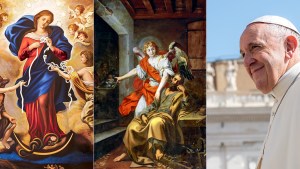A line from Pope Pius IX’s 1870 decree by which St. Joseph was declared patron and protector of the universal Church strikes me as an open window into the home of Nazareth.
The Church, Pius said, “after the Blessed Virgin, his spouse, has always held [Joseph] in great honor and showered him with praise, having recourse to him amid tribulations.”
I originally misread it, and formed the idea of the Blessed Virgin, not the Church, showering Joseph with praise. My imagination sat with that and savored it.
Our Lady, the humble girl of Nazareth, the future queen of heaven, lovingly showering her spouse with praise. Her affections and affirmations would have been answered with his own unabating honoring of her, as the first representative of the first generation of all those generations that would call her blessed.
Our Savior had left the glories of heaven to take residence in that holy house, but with such interchange between his parents, he must have experienced some taste of what he’d left behind.
When I realized that I’d misread the line from the decree — that it was the Church doing the praising, not Mary — it seemed to me a providential error. What a lesson for me (my husband doesn’t hear nearly enough praise from his wife). And as Mary is the image of the Church, in this too I’m sure the Church is following her example.
I love St. Joseph — my firstborn, who was due on his feast day, carries his name — but I’ve never had a particularly strong devotion to him. Yet when I find him in prayer, his testimony and example always bring light. Just like you’d expect from a dad, I guess.
Centuries of devotion
One factor that can complicate devotion to St. Joseph is his silence. There are a handful of references to him in Scripture, but he himself never speaks.
Nevertheless, the Church even in just the last couple centuries has given us much to consider about his life. Pope Francis has written an apostolic letter about him and declared a Year of St. Joseph from December 8, 2020, to December 8, 2021. This, in fact, marks the 150th anniversary of the aforementioned declaration of Joseph as patron of the Church.
Just a few years after that declaration, in 1889, Pope Leo XIII devoted an encyclical to him. (I always love reading old documents of the Church. Imagine what the poor pontiff would think if he were alive today, since in 1889 he had this to say: “We see faith, the root of all the Christian virtues, lessening in many souls; we see charity growing cold; the young generation daily growing in depravity of morals and views; the Church of Jesus Christ attacked on every side by open force or by craft …”)
On the 100th anniversary of that document, Pope St. John Paul II offered an apostolic exhortation on St. Joseph, which includes a mini-reflection on eight key moments in Jesus’ life when Joseph was the protagonist. These could serve as mysteries of a “Joseph rosary”: the census, the birth, the circumcision, conferral of the name, presentation in the temple, flight into Egypt, Jesus’ stay in the temple and the support and education of Jesus in Nazareth.
Both Leo’s and John Paul II’s documents are brief but provide much fruit for meditation.
There’s also the Litany of St. Joseph, promoted for public use by Pope Pius X, but rather unknown today.
Without any words of Joseph’s own to meditate upon, the listing of his virtues in the litany gives direction to our prayer: He is remembered as just, chaste, prudent, strong, obedient and faithful.
Then there’s the special titles attributed to him, some an invitation to virtue, others a source of comfort in life’s difficulties. Mirror of patience, for example, and lover of poverty. But also solace of the wretched and patron of the dying. I’m going to introduce my own Joseph to the saint’s title as terror of demons. What action hero-crazed 7-year-old wouldn’t relish contemplating his patron in that way?
Yes, St. Joseph has much to tell us, even in his silence.
As Paul VI said: “He is the proof that in order to be a good and genuine follower of Christ, there is no need of great things — it is enough to have the common, simple and human virtues, but they need to be true and authentic.”

Read more:
Pope Francis’ devotion to St. Joseph Sleeping and Mary Untier of Knots
